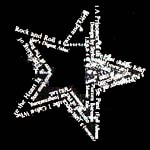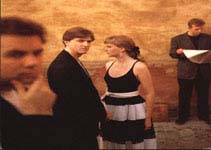

|
 |
Inicio / Intro / Campaña / Letras y Portadas / Fanzines / Sencillos / Conciertos en CD / Animaciones / Videos / Preguntas Frecuentes / Entrevistas / Acordes de Guitarra / Libro / Artículos / Fotos / Protectores de Pantalla / Enlaces / Recursos en la Red / Novedades / Mapa del Sitio
![]()
| Swoon | |||
| Una Vida de Sorpresas | |||
| I
Trawl the Megahertz |
Cuando me pidieron que escribiera una introducción para su grabación, pensé: bien, mantenlo corto y claro, di algo que ellos podrían decir, como: Las Palabras Son Trenes Que Retroceden Que Realmente No Tienen Nombre. Estas son canciones Escritas Sin Necesitarlo. Eso es Swoon.
Pero eso suena algo roquero, y ellos odiarían algo así. De cualquier forma, ahora es un poco tarde y lo estoy escuchando por enésima vez.
Mi marido se fue a la cama hace una hora, no que tenga algo en contra de los Sprouts, sino que se debe levantar temprano. No me uniré a él, por al menos unos cuarenta minutos. Eso es Swoon.
Emma Welles 1984
¿ Cómo va esa canción ? "Recuerdos que iluminan las esquinas de mi mente. Recuerdos melancólicos de cómo éramos".*
Como todos sabemos, los recuerdos pueden ser fabulosos mentirosos, y al retroceder diez años desde que lanzamos nuestro primer disco, "Leones En Mi Jardín", no me siento infeliz al ver que los detalles cotidianos de nuestra legendaria carrera se han convertido en manchas sobre el tapiz del tiempo, formando algunos increíbles recuerdos melancólicos.
¿ Realmente grabamos las pistas de nuestro primer album "Swoon" en una tarde, creyendo al terminarlo un mes después que competiría con "Thriller" como una propuesta comercial ?
¿ Acaso realmente audicionamos a 147 bateristas por 5 días para luego darnos cuenta que el primer postulante era el hombre ideal para el trabajo ?
¿ Quién dedicó tres días completos en el Estudio con la medium Phyllis King intentando grabar la voz del finado Elvis Presley, sólo para contactar a un espíritu atormentado que se identificó como Coronel Tom, quien quería el 35% de cualquier trato que se hiciera ?
¿ Acaso Johnny Marr apareció en el estudio de R.A.K. con una grabadora y una cinta de "William Realmente No Era Nada" mientras grabábamos "Cuando El Amor Se Estropea" ? Y ¿ realmente grabamos ese sencillo 5 veces durante 18 meses antes de que finalmente se volviera un éxito, monopolizando el puesto número 1 por cinco semanas ?
¿ Fue un sueño o escuchamos a hurtadillas a Stevie Wonder mientras tocaba su solo de armónica para "Ruiseñores " - sentado detrás de una gigantesca pintura de Jimi Hendrix en los Estudios de Westworld ? ¿ Atesoramos la fotografía ?
¿ Acaso dejamos de ir a giras por cinco productivos años ? ¿ Dedicamos meses discutiendo los más mínimos detalles, olvidando la amarga sabiduría que sólo son discos, que significan todo y nada ?
¿ Y estuvimos grabando en un estudio de Los Angeles cuando la voz más famosa en el mundo, ese hombre de Hoboken, nos preguntó si queríamos un pedazo de pizza para celebrar su cumpleaños número 69 ? ¿ Nos acordamos de eso o el tiempo ha reescrito cada línea ?
Diez años de hacer discos pueden justificar una recopilación de Lo Mejor De, pero es difícil sentirse nostálgico cuando deseas que lo mejor esté aún por llegar. Y ¿ quién sabe ? Es una vida de sorpresas.
Paddy McAloon May '92
* Disculpas a Alan y Marilyn Bergman, quienes escribieron " Cómo éramos " (The Way We Were) popularizada por Barbra Streisand.
Johnny Marr junto con Morrissey formaron The Smiths y "William Realmente No Era Nada" fue uno de sus grandes éxitos.
Ese hombre de Hoboken, era por supuesto, Frank Sinatra.
'I Trawl the Megahertz' seems to be a portrait of a woman who is trying to make sense of her life by reviewing selected momories. She is like someone with their hand on a radio dial, turning into distant stations, listening to fragments of different broadcasts. I say 'seems to' because a degree of vagueness suits my purpose and reflects the tentative way in which 'Megahertz' was written.
In 1991 I went through a period of ill health that meant I was unable to write music in my usual manner - that is, hunched over a keyboard and staring cluelessly at a computer screen. (As you are too polite to ask, the problem was eye surgery followed by shingles followed by eye surgery. And while you're down there Nurse...) I found all this frustating as I've been writing songs since 1971, and am subject to itchy, unpleasant withdrawal symptoms if I cannot work. So, unable even to read, I passed the time by listening to and tapping all kinds of T.V and radio programmes, concentrating on phone-ins, chat shows, citizen's band conversations, military encryptions - you name it, I was eavesdropping on it.
The more cynical among you are probably anticipating where all this is leading - an announcement to the effect that I have discovered a cure for insomnia. All right, so ninety percent of the stuff I recorded was boring: but isn't ninety percent of most things? What actually happened is that, almost against my will, I started to edit mentally some of the things I'd heard. Odd words from documentaries would cross-pollinate with melancholy confidences aired on late night phone-ins; phrases that originated in different time zones on different frequencies would team up to make new and oddly affecting sentences. And I would change details to protect the innocent (or guilty), to streamline the story that I could hear emerging, and to make it all more ... musical, I suppose.
It now seems obvious that this was the thwarted lyric writers' subconscious taking control: unable to write songs, it was organizing what I had collected into something that was part love song and part lament. (Have you any idea how many sad stories are floating over the airwaves after midnight?) To be frank, the finished item required a good deal of intervention and finessing (with respect, the average citizen's band exchange is not in the front line of the war against cliche) So I own up to jettisoning a lot of the source material that had been like scaffolding for the piece, and as the narrator's character became clearer. I filled in a lot of details of her story myself.
Eventually, and ironically, I came to write and shape all of 'I Trawl the Megahertz' music on a computer. In fact, I cannot think of anything else I've written that is so dependent on technology for its existence. For it is a sad fact that I am a musical ignoramus who has found dedicatd music software invaluable. Without it I simply have no means of road-testing certain ideas. (If I asked, I still wouldn't be able to play a single bar of this record, as it was all written - after the fashion of a monkey at a word processor - straight onto the score page of my computer screen.)
With this shameful admission, it is entirely appropiate that I now thank Calum Malcolm and David McGuinness who breached the gap between my virtual midi-instrument world and that of real players: thank guys for helping to translate my illiterate ideas into scores that professional musicians could read without laughing. And thanks to these musicians for their patience and skill, and to Keith Armstrong, for again finding a way to finance an ambitious recording. Finally, a word about the mysterious Yvonne Connors - the voice of 'I Trawl the Megahertz.' She was recorded between 6.15pm and 8.45pm in roon 551 of The Royal Garden Hotel, Kensington, London, on October 25th, 1999. What more do you need to know? I now cannot imagine the piece without her. So thank you Yvonne, and thank you V. and Lucy Cuthbertson who led me to you, I hope you enjoy this record which is dedicated to my brothers, Martin and Michael.
Paddy McAloon
![]()